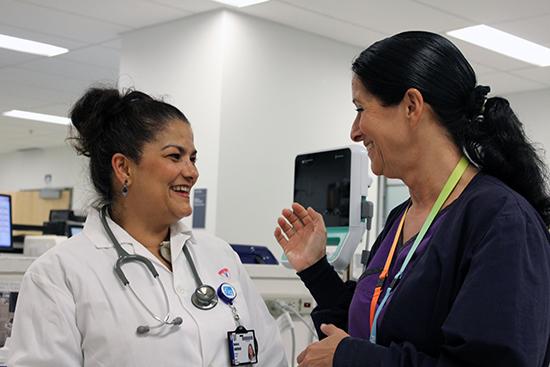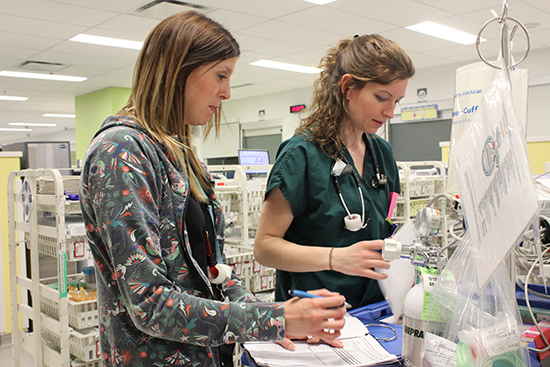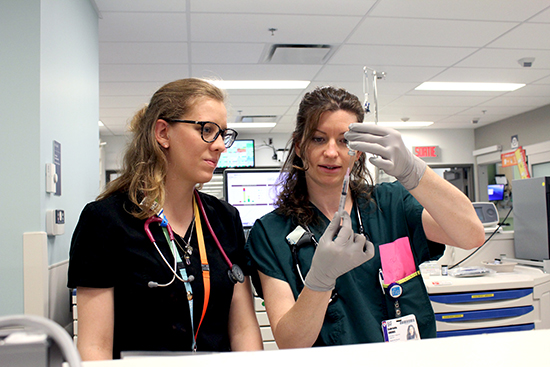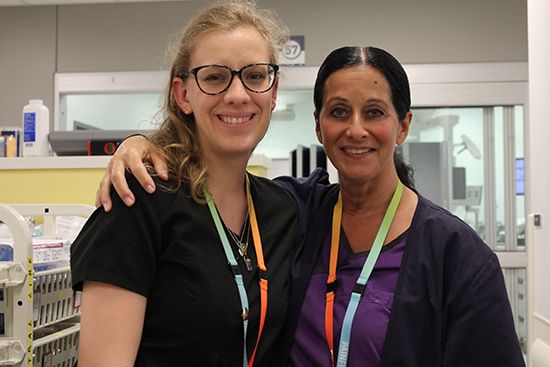Evenings and nights in the RVH emerg
“Working in the ED puts life into perspective. It helps you choose your battles in life, and it makes you count your blessings.” This is just a glimpse into the mindset of McGill University Health Centre (MUHC) Emergency Department (ED) nurse Dolores Dandrade, who has been working at the Royal Victoria Hospital (RVH) ED for 23 years.
Walking into the Emergency Department is akin to walking into another dimension. Everything is dealt with differently, and seen through a unique lens. The team works tirelessly at saving lives, and each shift poses its unique challenges. As Dolores and Kris Kourakis, a nurse with 20 years of experience, explain, it takes a certain type of person to work in an ED on any given shift, and a certain “breed” of nurse to work evenings and night shifts.

We take blood samples, and all those things, but real nursing is about that connection you have with certain patients. - Kris Kourakis
Nocturnal nursing
“At night, there are fewer resources, less doctors, less support people but we have each other, we need each other, and that’s what counts. We are very tight,” says Dolores, who has been working nights for most of her career, and confesses that the night shift is where she thrives.
“We’re working together in such difficult situations; we see people cry, we see people die, its high stress,” says Agathe Lapointe, a nurse who has been with the MUHC for five years, three of those in the ED. “So within the staff we do create this kind of family. You have each other’s backs all the time.”

Agathe admits that starting out in the ED can be pretty difficult. The ED sees all types of cases, so there is a constant learning and sharing of expertise related to different illnesses.
“To be organized in your head while there’s organized chaos around you, it takes a bit of time to grasp,” she says.
But she quickly learned that there is always someone to turn to for support.
“There’s a lot of help from the older nurses, like Dolores and Kris. You will never be seen as someone who doesn’t know what they are doing if you ask questions. You’re encouraged to learn and grow.”
According to Agathe, when there is an urgent case, everybody mobilizes to see if help is needed.
“Since we are a huge hospital, we receive some intense cases. It’s always busy,” Agathe says. “But it’s pretty crazy how everybody just gathers and jumps in the action when a case comes in. You are never left alone. I get chills when I think about how we work, it’s pretty amazing.”

I get chills when I think about how we work, it’s pretty amazing. - Agathe Lapointe
Dolores admits that it can be difficult. In the ED, nurses are seeing patients at their worst. She often thinks of her own family, and her four teenage girls, especially when she’s treating young patients. But it’s this empathy that also allows her to do her job so effectively.
“You’re living these people’s pain and a lot of people can’t handle it, they’ll burn out. They take it home with them. I’ve cried with my patients, I’ve cried when I’ve left my patients, I’ve cried two weeks later thinking about it,” she admits. “But that’s fine. As long as it doesn’t affect me in the long run, and I do not let it interfere with my family, with my children, with my health. I put things into perspective,” she explains.
For Kris, her rule is simple: balance.
“You’re accumulating all this adrenaline and these emotions, but once you`re finished, you need to take care of yourself. I always have this discussion with the young nurses; you have to do whatever it takes to keep yourself healthy,” she explains.
Overcoming obstacles
It’s no secret that the RVH ED staff are working non-stop to accommodate the constant influx of patients who present with all types of medical emergencies.
Kris and Dolores are honest in acknowledging the complexity in their jobs; balancing the tasks required of them, seeing to as many patients as possible (as quickly as possible), and all the while ensuring that frustrated or upset patients are heard and feel cared for.

You’re accumulating all this adrenaline and these emotions, but once you`re finished, you need to take care of yourself. - Kris Kourakis
“I don’t sugar-coat things for patients, you have to be kind but real with them,” Dolores says. “I once had a lady who was diagnosed with pancreatic cancer. I went into her room and asked her ‘how are you today,’ and she responded, ‘not very good.’”
The woman went on to tell Dolores that she was going to die, and that she was feeling completely dejected.
“I said ‘listen to me for a minute, each and every one of us, every day we live is a day closer to our death; we’re all going to die. It’s about how we make use of what we have left.’ I asked if her options were explained to her, her treatment, and she said yes. I told her she wasn’t alone, she had family in the room, people that love her and will help her through this. Some don’t have that. And she looked at me and started crying. She said thank you. She later brought me flowers and chocolate,” Dolores says.
“You see, that example, that’s real nursing. We take blood samples, and all those things, but real nursing is about that connection you have with certain patients,” says Kris. “It’s the ability to take their situation and turn it around a little bit, and show them a different perspective. You can’t do it with everyone in the ED, but you try.”
